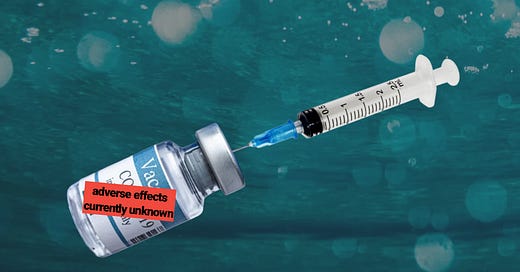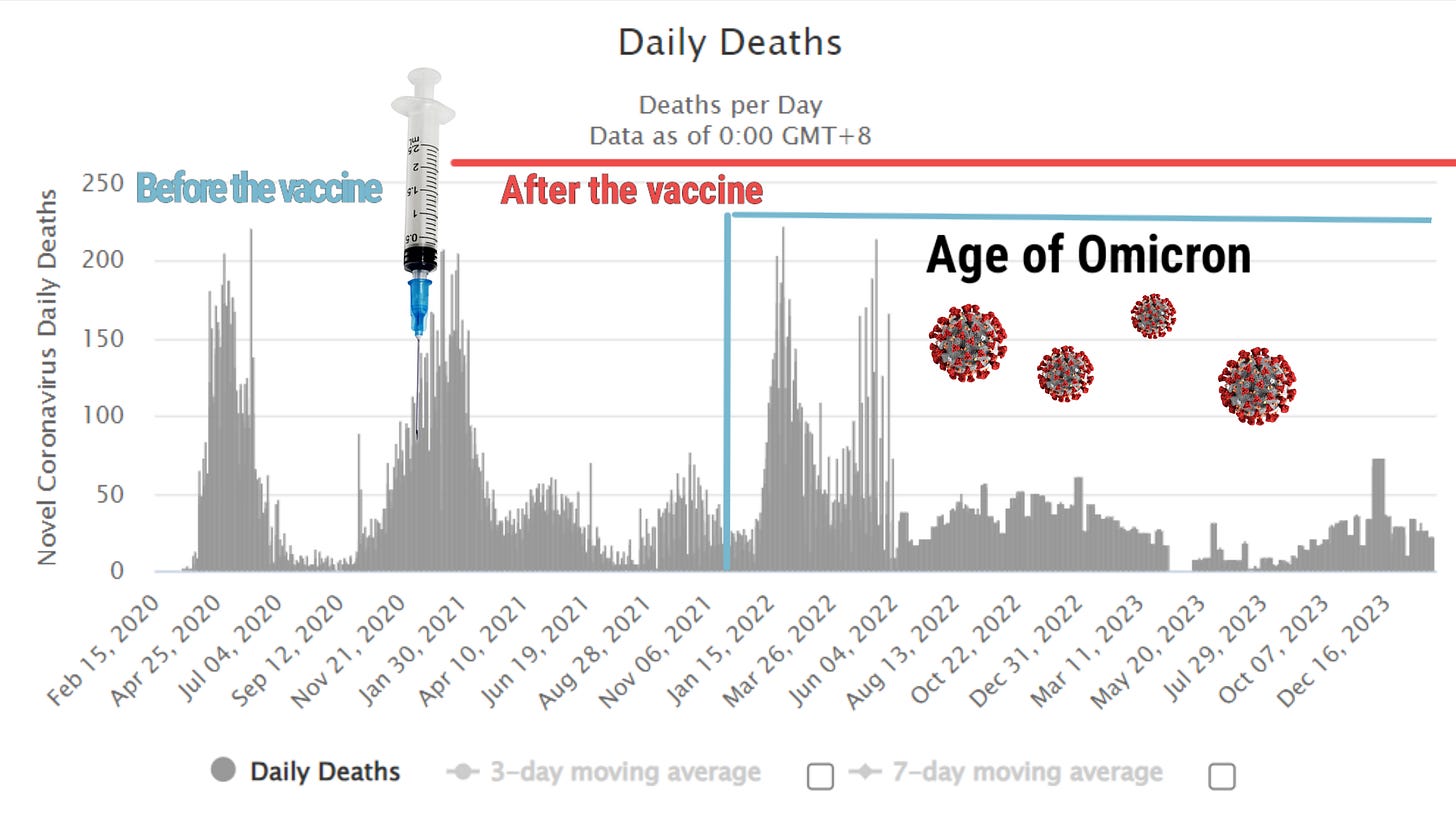Safe and Effective? Not According to Pfizer
The Pfizer trials never revealed that their vaccine would save lives, and there is scant evidence that they did.
I’ve recently discovered that you can now access Canada's purchase agreement with Pfizer-BioNTech. Of course, half of it is redacted, notably the part about how much it cost us, and most of the rest of it you likely wouldn't want to read anyway, but the really interesting part to me is under "Purchaser Acknowledgment,” and says this (emphasis mine):
Purchaser further acknowledges that the long-term effects and efficacy of the Vaccine are not currently known and that there may be adverse effects of the Vaccine that are not currently known.
Sounds a bit different than, "We know the vaccine is safe and effective," doesn't it?
This was signed on October 26, 2020.
The following statement from Health Canada appeared on CTV News about six weeks later:
Health Canada has determined that the Pfizer-BioNTech vaccine meets the Department's stringent safety, efficacy and quality requirements for use in Canada.
I wonder if Health Canada’s stringent safety, efficacy and quality requirements ever required the vaccine’s effect to last longer than six months. Or actually stop people from getting and spreading the disease.
The BBC ran this story as well and felt the need to add a helpful teaching aid so that their readers would know just how “safe and effective” the vaccine is.

I used the following two images in a previous post, but I’m going to use them again because they illustrate the point so well.
This first chart from Statista.com titled Number of select vaccine-preventable disease cases before and after the introduction of vaccinations in Canada as of 2015 shows us very clearly what we all understand an actual vaccine does. Notice the difference in the case count between the then and now columns. Also notice that the Covid vaccine is not on this chart.
This next graph shows us very clearly what we now understand the covid “vaccine” does, namely, not a hell of a lot. Or possibly even the opposite of what it's supposed to do.
It really looks as though the new Omicron variant had an awful lot more to do with the reduced death toll than any of the “vaccines” did. Sort of makes one wonder what might have happened had we just left the whole thing well enough alone.
Remember, the above results are from a vaccine that Canadians were mandated to take. People lost their livelihoods and even friends and family members for deciding against it.
In Manitoba where I live, there are no mandates for any vaccines, yet people get them all the time. The school lets us know when they're vaccinating kids in the school and we can refuse it if we want to. We never do because we know they work. They do exactly what they've been designed to do and as far as we know, they’re reasonably safe. These vaccines have track records spanning decades so there's really no need for a mandate. See where I'm going with this?
In case you haven’t surmised where I’m headed, I’ll point you back to that top quote from Pfizer and all the stuff that they did not know about the product they sold our government - namely the long-term effects and efficacy of the Vaccine as well as its adverse effects.
Even though one of the things we actually did know fairly early on was that the vast majority of people weren’t going to get very sick from this disease, decisions were still made to rush it through without proper testing and in some places (like Canada) to mandate that everyone get it anyway.
As I keep saying, most of what we know now, we already knew early on. Here’s a BMJ article published on October 21, 2020, five days before our government signed the deal with Pfizer:
Did you really think they would? Well, I guess most of us did, though that number is considerably smaller at this point. But why, when there was literally no data saying they would? And do you really believe that everyone in our Public Health department was completely unaware of this fact? Maybe Theresa Tam just missed this page as she was flipping through it with her morning coffee?
Do you feel duped yet?
Anyway, now that we can actually see that the effectiveness isn’t all that great, safety studies are finally being done. In case you’re not aware, effectiveness is how a vaccine performs in the real world, while efficacy is how it performs under ideal situations in a lab. The reason scientists have finally got around to studying these things for safety is because there have been many more adverse events than what would normally be expected from any medical intervention, as well as a lot of extra people dying, but not from Covid.
From Statistic Canada’s website:
Since the onset of the pandemic, older Canadians have experienced a disproportionate share of both excess deaths and COVID‑19-caused deaths. From March 2020 to early March 2021, about one third of the excess mortality and just over half of the deaths caused by COVID‑19 observed in Canada involved individuals older than 84. However, those younger than 65 years have accounted for just over 10% of the deaths attributed to COVID‑19 but 30% of the excess deaths, suggesting that other factors are driving excess mortality among younger Canadians. While COVID‑19 has been a main driver of excess deaths overall, other factors are driving excess mortality as well, particularly among younger Canadians.
Now, after more than three years, and many real-world observations, many scientists suddenly seem to think that this should be studied a little more in-depth. Most countries have now stopped recommending the vaccine for young, healthy populations. Well, not the United States, where the CDC still recommends everyone over 5 years old get it, and definitely not Canada, where our government recommends the Covid vaccine for anyone over 6 months, and pregnant and nursing mothers, whether they need it or not. And though our government also assures us (over, and over, and over again) that the vaccine is safe and effective, we now have studies like this one:
The above study looked at the Pfizer and Moderna vaccines and found an average of 1 in 800 serious adverse events of special interest (AESIs) from various iterations of those vaccines. Just to be clear, these aren’t just regular adverse events (which are by definition, not good), but serious ones.
Here's how the authors of this study define serious adverse events:
An SAE was defined as an adverse event that results in any of the following conditions: death; life-threatening at the time of the event; inpatient hospitalization or prolongation of existing hospitalization; persistent or significant disability/incapacity; a congenital anomaly/birth defect; medically important event, based on medical judgment.
As I said, the average number of adverse events was 1 out of every 800 injections, but this number jumped to 1 in every 555 doses when just the Pfizer vaccine (by far the most common choice) was studied.
There are some things that are considered to be pretty basic, you might even say common knowledge. These are things like:
Leaving the milk out on the counter for two days will likely result in sour milk.
Telling your wife to calm down is unlikely to achieve the desired result.
When you leave your steak on the deck table to go in and grab a beer, you shouldn’t be surprised to find the dog happily chowing down on it when you return.
Yet another of these basics is our current understanding of vaccines. From Health Canada’s Basic Immunology and Vaccinology page:
An ideal vaccine is: safe with minimal adverse effects; effective in providing lifelong protection against disease after a single dose that can be administered at birth; inexpensive; stable during shipment and storage; and easy to administer.
I think at this point we can now say in the most charitable fashion that the covid vaccine is anything but ideal. Well, at least it had the last one going for it…
We keep hearing about how rare and minimal these adverse events are, but look at that list again and then think about the pros and cons of an average person (like 90% of people) who, if they don't get vaccinated is at worst going to miss a week of work, or more than likely is not even going to realize they’ve been infected, if they get infected at all. Where was the cost/benefit analysis for this, and why is it that when someone else finally does one (in effect doing the job that Public Health failed to do), that person is called an antivaxxer?
The most important question we should all be asking is this one: Is this really a vaccine that should have been mandated for the general public, including young children and pregnant and nursing mothers? The fact that it’s not currently mandated should in no way be reason to forgive or forget the fact that it was. And really, should this vaccine even be recommended for anyone not in a high-risk demographic now? There is still so much we don’t know about the long term effects of this shot, regardless of what we’ve been told, and for the reasons outlined above, I’m not terribly confident in any of what we’ve been told.
At this point, it’s a little late to turn back, and a little late for trials, unless we are the trial.













Along those lines...I haven't found which trials have determined more Covid-19 vaccinated patients recovered from the infection because the "vaccine" worked, vs those vaccinated and the patient's own immune system did the work "despite" the jab. We know who will say the "vaccine" boosted the patients ability to fight off some variants of Covid based on "belief" it did, but did it really when compared to how well a healthy person's immune system was likely to defeat Covid without the shot? Think "placebo-effect" here for those with strong immune systems getting the jab vs those perhaps tens of millions or more who recovered from Covid without knowing they ever had it, including before CoVid-19 got its name.
Ken, this is another good post where hurried policy-making far outpaced the reliable science to back it up resulting in more people potentionally (and actually) being harmed or worse, for nothing more than political expedency.
You're going to have to be a little more specific there, Ned because I watched that video and it doesn't debunk anything I said here, let alone "everything".